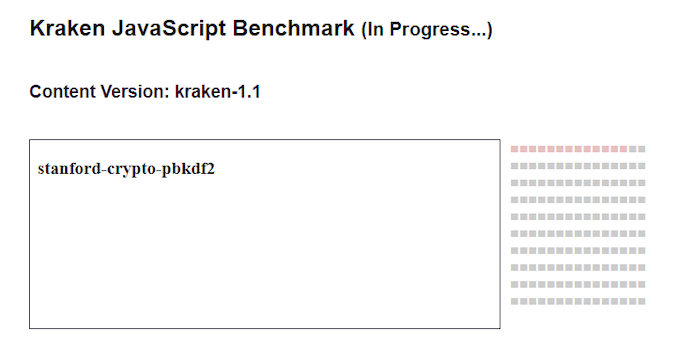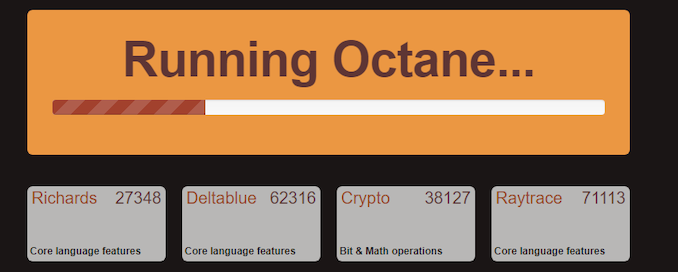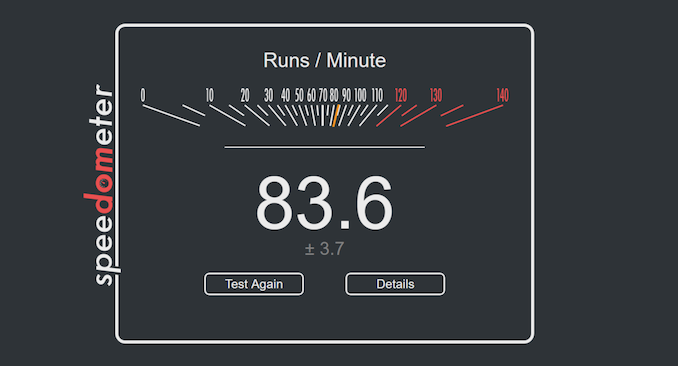Intel 11th Generation Core Tiger Lake-H Performance Review: Fast and Power Hungry
by Brett Howse & Andrei Frumusanu on May 17, 2021 9:00 AM EST- Posted in
- CPUs
- Intel
- 10nm
- Willow Cove
- SuperFin
- 11th Gen
- Tiger Lake-H
CPU Tests: Legacy and Web
In order to gather data to compare with older benchmarks, we are still keeping a number of tests under our ‘legacy’ section. This includes all the former major versions of CineBench (R15, R11.5, R10) as well as x264 HD 3.0 and the first very naïve version of 3DPM v2.1. We won’t be transferring the data over from the old testing into Bench, otherwise it would be populated with 200 CPUs with only one data point, so it will fill up as we test more CPUs like the others.
The other section here is our web tests.
Web Tests: Kraken, Octane, and Speedometer
Benchmarking using web tools is always a bit difficult. Browsers change almost daily, and the way the web is used changes even quicker. While there is some scope for advanced computational based benchmarks, most users care about responsiveness, which requires a strong back-end to work quickly to provide on the front-end. The benchmarks we chose for our web tests are essentially industry standards – at least once upon a time.
It should be noted that for each test, the browser is closed and re-opened a new with a fresh cache. We use a fixed Chromium version for our tests with the update capabilities removed to ensure consistency.
Mozilla Kraken 1.1
Kraken is a 2010 benchmark from Mozilla and does a series of JavaScript tests. These tests are a little more involved than previous tests, looking at artificial intelligence, audio manipulation, image manipulation, json parsing, and cryptographic functions. The benchmark starts with an initial download of data for the audio and imaging, and then runs through 10 times giving a timed result.
We loop through the 10-run test four times (so that’s a total of 40 runs), and average the four end-results. The result is given as time to complete the test, and we’re reaching a slow asymptotic limit with regards the highest IPC processors.

Google Octane 2.0
Our second test is also JavaScript based, but uses a lot more variation of newer JS techniques, such as object-oriented programming, kernel simulation, object creation/destruction, garbage collection, array manipulations, compiler latency and code execution.
Octane was developed after the discontinuation of other tests, with the goal of being more web-like than previous tests. It has been a popular benchmark, making it an obvious target for optimizations in the JavaScript engines. Ultimately it was retired in early 2017 due to this, although it is still widely used as a tool to determine general CPU performance in a number of web tasks.

Speedometer 2: JavaScript Frameworks
Our newest web test is Speedometer 2, which is a test over a series of JavaScript frameworks to do three simple things: built a list, enable each item in the list, and remove the list. All the frameworks implement the same visual cues, but obviously apply them from different coding angles.
Our test goes through the list of frameworks, and produces a final score indicative of ‘rpm’, one of the benchmarks internal metrics.
We repeat over the benchmark for a dozen loops, taking the average of the last five.

Legacy Tests

















229 Comments
View All Comments
mode_13h - Tuesday, May 18, 2021 - link
It's now royalty-free and completely intertwined with USB4. So, no... it's not going away.drothgery - Monday, May 17, 2021 - link
This presumes anything resembling parity in both availability and quality of the laptops the CPUs are in which historically has ... not been the case.eastcoast_pete - Monday, May 17, 2021 - link
Unfortunately, it's more "..if you can get.." rather than "..when you can get an AMD alternative".Azix - Monday, May 17, 2021 - link
power draw on a laptop is always going to be paired with battery capacity. It's about battery life right? Or maybe its about the heat on the bottom of the laptop.End of the day its mostly down to laptop design. The power consumption is likely to be transparent to the end user.
timecop1818 - Tuesday, May 18, 2021 - link
The Intel part would actually work tho, unlike AMD.Spunjji - Tuesday, May 18, 2021 - link
So many productive comments, and then this.Spunjji - Tuesday, May 18, 2021 - link
Not exactly. Between availability and incidentals like Thunderbolt, there are now reasons to opt for Intel where before they were nowhere near as compelling.I'd still err on the side of AMD as I prefer efficiency, but I'm sure others would go the other way.
Hifihedgehog - Monday, May 17, 2021 - link
LOL. No, it is not competitive. >90W boosts is NOT competitive. In long gaming sessions, its UNcompetitive power hungry soul is going to hamstring the GPU that shares thermals in a notebook chassis.Hifihedgehog - Monday, May 17, 2021 - link
And even with its increased power envelope, 8-core Tiger Lake H's multicore performance falls short of the best 8-core Ryzen 4000 series CPU (Ryzen 9 4900HS).SaturnusDK - Monday, May 17, 2021 - link
No, it's not competitive at all. Even if you ignore efficiency, you can't ignore the price.Intel laptops with mediocre CPUs are already more expensive than clearly superior AMD alternatives. These models will just widen that gap.
The unfortunate conclusion is that in 2021 isn't even remotely competitive in the laptop market.